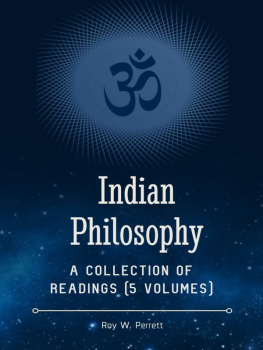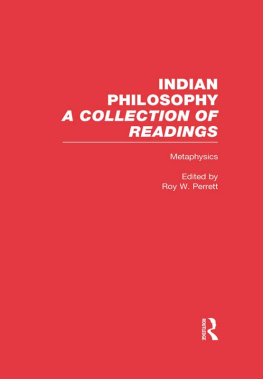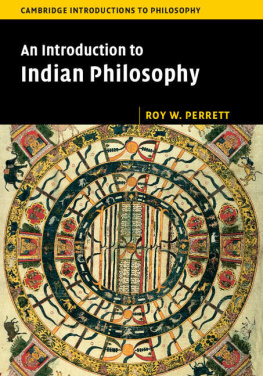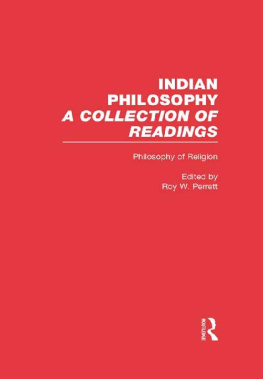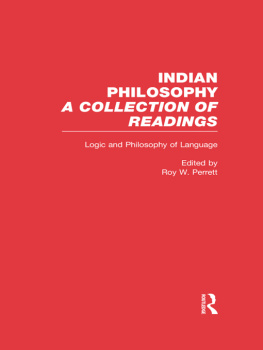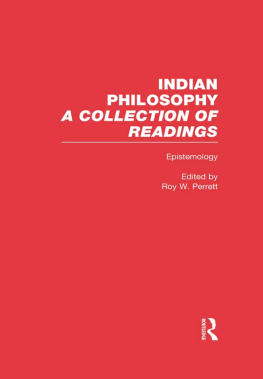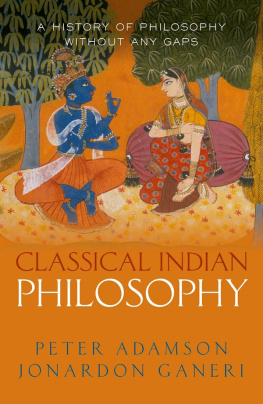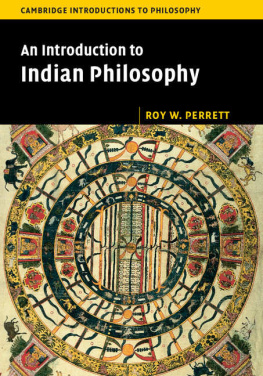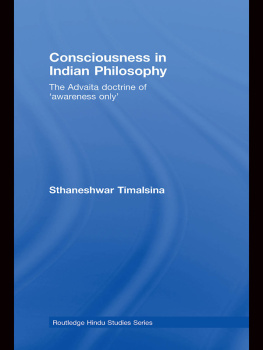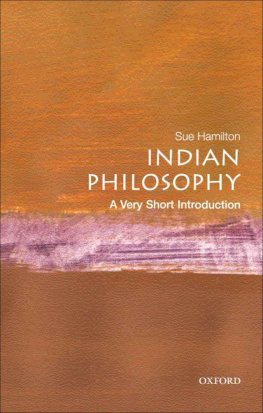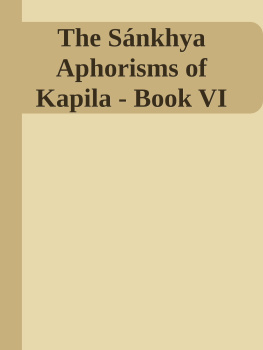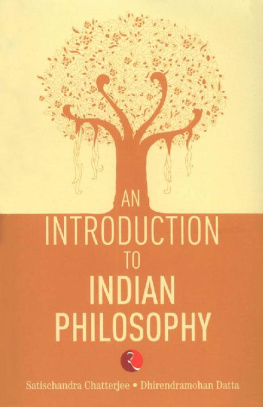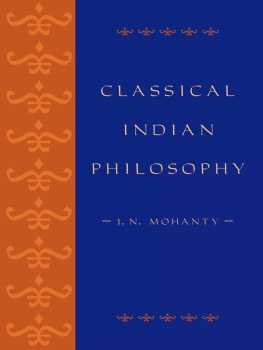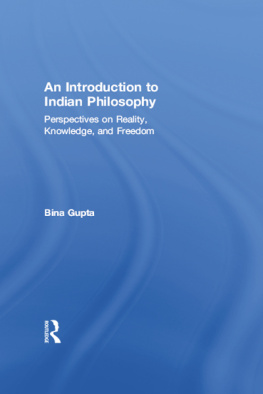Indian Philosophy
A Collection of Readings
Series Editor
Roy W. Perrett
Massey University
Series Contents
Epistemology
Logic and Philosophy of Language
Metaphysics
Philosophy of Religion
Theory of Value
Epistemology
Edited with introductions by
Roy W. Perrett
Massey University
Routledge
Taylor & Francis Group
270 Madison Avenue
New York, NY 10016
Routledge
Taylor & Francis Group
2 Park Square
Milton Park, Abingdon
Oxon OX14 4RN
Garland is an imprint of the Taylor & Francis Group
Introduction Copyright 2001 Roy W. Perrett.
All rights reserved. No part of this book may be reprinted or reproduced or utilized in any form or by any electronic, mechanical, or other means, now known or hereafter invented, including photocopying and recording, or in any information storage or retrieval system, without permission of the publisher.
The Library of Congress Cataloging-in-Publication Data
Epistemology / edited with introductions by Roy W. Perrett.
p.cm. (Indian Philosophy ; 1)
Includes bibliographical references.
ISBN 0-8153-3609-8 (alk. paper)
Knowledge. 2. Philosophy, Indic. I. Perrett, Roy W. II. Series.
B130.I63 2000 vol. 1
[B132.K6]
181.4sdc21
[121. 0954] 00-062308
| 5 volume set ISBN: | 0-8153-33670-1 |
| Volume 1: Epistemology | 0-8153-3609-8 |
| Volume 2: Logic and Philosophy of Language | 0-8153-3610-1 |
| Volume 3: Metaphysics | 0-8153-3608-X |
| Volume 4: Philosophy of Religion | 0-8153-3611-X |
| Volume 5: Theory of Value | 0-8153-3612-8 |
Contents
J. N. Mohanty
Mark Siderits
Jitendranath Mohanty
Shoryu Katsura
K.H. Potter
Bimal Krishna Matilal
Kalidas Bhattacharyya
Stephen H. Phillips
Chakravarthi Ram Prasad
C. Ram-Prasad
Karl Potter
J.L. Shaw
Roy W. Perrett
Arindam Chakrabarti
Jitendranath Mohanty
No anthologist succeeds in including everyone's favorites, so a few words about the principles of selection seem appropriate. Firstly, as with other volumes in this Garland series, priority has been given to journal articles, rather than book chapters. However, some essential book chapters have been included, and the introductions to each volume include references to significant books. Readers in search of further bibliographical assistance should consult what is now the standard source: Karl H. Potter, Bibliography of Indian Philosophies, 3rd rev. ed. (Delhi: Motilal Banarsidass, 1995), and the on-line updates to it available at the Indian Philosophy Bibliography (http://faculty.washington.edu/kpotter/). Secondly, the emphasis throughout is on philosophical studies of Indian philosophy. Consequently, much excellent historical and philological work has been omitted. Thirdly, the desire to make Indian philosophy accessible to interested Western philosophers has meant not only that all the selections are in English, but also that most of them use a minimal amount of unglossed Sanskrit terminology. This restriction has prevented the inclusion of more work by Indian authors.
Finally, I would like to acknowledge gratefully all the good advice and generous assistance I have received from Chakravarthi Ram-Prasad, Mark Siderits, and (most especially) Stephen Phillips. The blame for any shortcomings that may remain rests, of course, solely upon my own shoulders.
The five volumes of this series collect together some of the most significant modern contributions to the study of Indian philosophy. Indian philosophy is one of the great philosophical traditions of the world. Unfortunately, however, its philosophical riches are not always as readily accessible to Western philosophers as might be desired. The selections in these volumes help to redress this situation by giving readers easy access to some of the best philosophical work in the area, including material that is often difficult to locate.
Collectively the selections in these volumes explore many of the important commonalities and differences between the Indian and Western philosophical traditions. These similarities and differences are philosophically pregnant. There is enough in common between Indian and Western philosophy to suggest that the philosophers in both traditions are often engaged with similar problems and hence should be able to communicate with each other. However, there are also sufficient differences between the traditions to suggest that they may have some novel perspectives to offer each other.
In choosing the selections for this series priority has been given to journal articles, rather than book chapters. However, some essential book chapters have been included, and the introductions to each volume include references to significant books. The emphasis throughout is on philosophical studies of Indian philosophy. The desire to make Indian philosophy accessible to interested Western philosophers has meant not only that all the selections are in English, but also that most of them use a minimal amount of unglossed Sanskrit terminology.
Volume 1: Epistemology is concerned with the nature and scope of Indian prama theory, i.e. that part of Indian philosophy concerned with the nature and sources of knowledge. Indian philosophers developed a causal theory of knowledge and acknowledged the existence of a number of valid ways of knowing, including perception, inference and testimony. The Indian prama theorists thus discussed many issues that have also occupied Western epistemologists, often offering importantly different perspectives on these matters. They also sometimes addressed various interesting questions about knowledge that are unfamiliar to Western epistemologists.
The selections in this volume discuss Indian treatments of epistemological topics like the means of knowledge, realism and anti-realism, truth, knowledge of knowledge, illusion and perceptual error, knowability, testimony, scepticism and doubt.
Volume 2: Logic and Philosophy of Language is concerned with those parts of Indian prama theory that Western philosophers would count as logic and philosophy of language. Indian philosophers and linguists were much concerned with philosophical issues to do with language, especially with theories of meaning, while the Indian logicians developed both a formalised canonical inference schema and a theory of fallacies. The logic of the standard Indian inferential model is deductive, but the premises are arrived at inductively. The later Navya-Nyya logicians went on to develop too a powerful technical language, an intentional logic of cognitions, which became the language of all serious discourse in India.
The selections in this volume discuss Indian treatments of topics in logic and the philosophy of language like the nature of inference, negation, necessity, counterfactual reasoning, many-valued logics, theory of meaning, reference and existence, compositionality and contextualism, the sense-reference distinction, and the nature of the signification relation.
Volume 3: Metaphysics is concerned with the complement to prama theory, i.e. prameya theory. Whereas the pramas are the means of knowledge, the prameyas are the knowables, cognisable entities that constitute the world. With respect to the number and kinds of such entities, there was a very wide variety of opinion among classical Indian philosophers including variants of monism, dualism and pluralism about both entities and kinds. Many metaphysical topics were debated, but two of the most important were causation and the nature of the self. The competing theories offered about these two issues also raised other questions about the metaphysics of wholes and parts, substances and properties, and universals and particulars.
Next page
